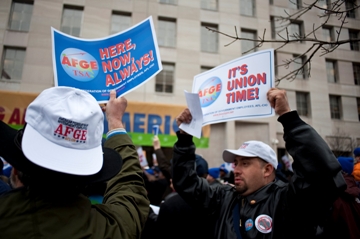After the Freeze: Real Reforms Toward Fair Federal Pay: "
President Barack Obama announced today that he will ask Congress to freeze federal worker pay for the next two years saving $5 billion through 2012. Good for him. This is a welcome acknowledgment on two fronts: 1) that, as Heritage research has definitively shown, federal workers are paid more than their private sector counterparts even after accounting for skills and education; and 2) that our federal budget deficits are driven by a spending, not a revenue, problem.
But while President Obama should be congratulated for this small step toward fiscal sanity, a federal pay freeze is not enough and far more than $5 billion could be saved be reforming federal worker pay. Heritage Foundation Senior Labor Analyst James Sherk writes:
Federal employees earn between 30 percent and 40 percent more than equivalently skilled private-sector workers. This represents costly forced sacrifices by lower-earning American taxpayers. … [M]ost federal compensation is not a contractual obligation and Congress can reduce it in those positions which are overcompensated. If Congress reduced this federal pay to market rates this would save taxpayers about $47 billion a year— more than eliminating the entire Department of Commerce, Department of the Interior, or Department of Energy. It would be enough to fully offset the cost of patching the alternative minimum tax in 2012.
Instead of just a pay freeze, Sherk recommends:
- Abolish the General Schedule and implement performance-based pay. Congress should replace the General Schedule with pay-for-performance systems tied to market compensation. The Office of Personnel Management should set broad pay bands for each occupation and region of the country with managerial discretion to award raises for good performance, subject to budget limitations. OPM should adjust these pay bands up or down based on qualified applicant-to-position ratios and quit rates. This would align federal pay with market rates while allowing high-performing federal workers to earn what their skills merit.
- Hire More Private Contractors. Many jobs performed by federal employees are not inherently governmental tasks and can be performed by private-sector workers. However, federal regulations deter government agencies from hiring private contractors for this work. Congress should eliminate these regulations and instead require the federal bureaucracy to compete on cost and quality with private-sector workers to perform non-inherently governmental tasks. This would expose federal employees to the same market competition that private-sector workers face each day. This competitive pressure would force federal agencies to reduce compensation to market rates in order to keep work in-house. To the extent that more work was contracted out, it would also create more jobs for private-sector workers.
- Reduce Federal Benefits. Congress should reduce the generosity of its benefits to market rates. Paid leave should be reduced to comparable levels at private corporations. Congress should re-examine the utility of the existing defined-benefit plans and consider moving federal workers to a fully portable and funded 401(k)-style system instead.
- End Dismissal Restrictions. Federal workers who have passed their probationary period can only be fired with great difficulty. As a result, some federal workers slack off knowing they will not lose their jobs. Congress should allow government managers the same discretion to remove poor performers as that of private managers.

No comments:
Post a Comment